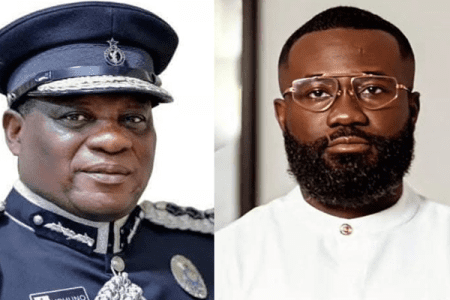The Ghana Police Service has filed an application at the High Court in Accra seeking to alter the location and timing of a planned demonstration organized by the Generational Rights Protection Society, led by activist and broadcaster Okatakyie Afrifa Mensah.
The protest, scheduled for April 28 and 29, is intended to call out successive governments for their failure to protect the environment from the ravages of illegal mining, popularly known as galamsey.
The proposed demonstration is slated to take place at the Liberation Square, located directly opposite the Jubilee House—the seat of government and a designated national security zone. This proximity, according to the Police, presents significant security risks.
Police cite security risks and lack of clarity
In an affidavit filed by General Sergeant Armstrong Ankomah on April 23, the Ghana Police Service urged the court to either stop the protest entirely or compel the organisers to move it to a different location and restrict the timeframe.
The Police specifically requested that the demonstration be rescheduled to take place between 10 AM and 5 PM on April 28, away from the Jubilee House.
The Police argued that intelligence gathered suggests the planned protest could be infiltrated by “undesirable elements” who may disrupt public peace and compromise national security.
The affidavit stressed that the organisers have not provided details about the expected participants or the nature of security arrangements in place.
Based on this intelligence and a security threat assessment, the Police are convinced that the protest, if allowed in its current form and location, could result in violence, pose threats to public safety, disrupt essential services, and infringe upon the rights of other citizens.
A battle over rights and restrictions
While the Ghana Police Service maintains that its position is grounded in preserving national security, the legal and civil implications of their move are sparking concern.
Article 21(1)(d) of Ghana’s 1992 Constitution enshrines the right of every citizen to freedom of assembly, including the right to participate in demonstrations and processions.
The Public Order Act of 1994 (Act 491) was enacted to give effect to this constitutional right, eliminating the requirement for demonstrators to obtain a Police permit before holding a protest. Instead, the law requires that organizers notify the Police, not seek their permission.
Critics have pointed to the growing practice by the Police of filing last-minute injunctions—often on an ex parte basis, without prior notice to the protestors—as a deliberate strategy to frustrate public demonstrations.
One such instance drew a scathing rebuke from the judiciary in the unreported “Let My Vote Count” case. Justice Adjei, sitting as an additional High Court Judge, described the Police’s ex parte approach under Act 491 as “unlawful, crude, and a breach of natural justice.
“The judge ruled that applications affecting fundamental rights such as the right to protest must be made on notice to allow affected parties the opportunity to respond.
Concerns over abuse of procedure
Legal experts and civil society groups have long argued that the absence of statutory timelines within which the Police must file such applications has become a tool to suppress civic activism.
By waiting until the eve of planned events to seek injunctions, critics say the Police effectively undermine lawful protest without giving organizers a fair opportunity to respond or re-strategize.
Moreover, while the Constitution permits restrictions on rights such as freedom of assembly in certain circumstances—such as to protect public order or national security—these restrictions must be reasonable, proportionate, and subject to judicial scrutiny.
The pending court decision, expected on April 25, will not only determine the immediate fate of the Generational Rights Protection Society’s anti-galamsey protest but could also have broader implications for how rights to public demonstration are exercised and protected in Ghana moving forward.
A test for civil liberties
The case has quickly become a test of Ghana’s commitment to upholding civil liberties in the face of competing national interests.
On one hand, there is a growing public outcry against illegal mining and environmental degradation, a cause that has drawn wide support from community leaders, youth groups, and environmental advocates.
On the other, the state cites compelling security reasons for curbing protests in sensitive areas.
As the High Court prepares to weigh these competing claims, all eyes will be on the bench to strike a balance between maintaining public order and protecting the right to peaceful assembly—a core pillar of any democratic society.
- Friday, April 25, 2025 Newspaper Headlines - 25 April 2025
- Valeria, the amputee giving 1,000 other amputees new life - 25 April 2025
- Moses Baiden calls for unified African tech strategy - 25 April 2025

